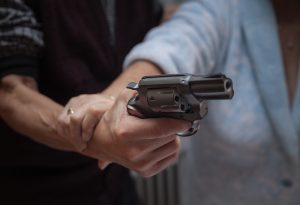Domestic violence agencies want guns taken from abusers
By Kevin Beese Staff Writer — July 31, 2024 Agencies serving victims of domestic violence say they will continue to push for passage of state legislation that would get guns out of the hands of abusers.
Agencies serving victims of domestic violence say they will continue to push for passage of state legislation that would get guns out of the hands of abusers.
Representatives of Legal Aid Society, Illinois Coalition Against Domestic Violence and The Network say they will ramp up efforts to get lawmakers to support the measure after the legislation failed to make it through the Illinois General Assembly this spring.
The legislation is named Karina’s Bill after Karina Gonzalez, who was killed in 2023, along with her daughter, in Chicago in an alleged domestic violence incident. Jose Alvarez allegedly shot Gonzalez and her teen daughter in Chicago’s Little Village neighborhood while there was an order of protection against him for a previous domestic violence incident.
Karina’s Bill would require law enforcement to confiscate firearms when an emergency order of protection is granted with a firearm remedy. It would also require a judge to issue a search warrant in cases where the remedy is granted, provided the judge finds probable cause that the individual possesses a firearm and is a threat to the victim.
Amy Milligan, domestic violence programming director for Metropolitan Family Services, said it is tough to swallow that the legislation still has not gotten through the Illinois Legislature.
“It is frustrating,” Milligan said. “I’ve been in the domestic violence field coming up on 30 years. It’s not

Amy Milligan
necessarily unexpected to me that there has been some difficulty with this bill. I think firearms-related bills generally have a tough road to approval. With gun laws, it is difficult to get everyone on board.”
Loren Gutierrez, managing attorney for Legal Aid Society, was instrumental in drafting the legislation for the bill. She also serves on policy committees for other organizations that provide domestic violence services.
“Karina’s Bill is one of the many bills and legislation that we have supported through our domestic violence coalition,” Gutierrez said.
Gonzalez was a Metropolitan Family Services client at the Howard & Evanston Community Center in Chicago.
Proponents say the bill speaks to the larger issue that victims of domestic violence aren’t often granted the safety that they deserve, even after their abusers return home.
The legislation would also prohibit gun owners from transferring firearms to another individual instead of surrendering the weapons, along with their Firearms Owner’s Identification Card, to law enforcement.
Advocates for victims of domestic violence have long been calling for the change, which this year, was contained in state House Bill 4469 and Senate Bill 2633.
Neither bill cleared a substantive committee this year, signifying they were never close to passage.
Proponents are hoping to get the legislation back before lawmakers in the fall veto session.
Milligan said continuing to push the issue and keep the proposal in the minds of residents and lawmakers is how proponents hope to get the bill over the finish line.
She noted that the legislation does not require that an individual be arrested before a weapon could be taken away from a suspected abuser, just the order or protection being issued.
“Karina’s Bill is so important,” Milligan said.
The Educational Fund to Stop Gun Violence notes that more than half of all intimate partner homicides are committed with guns. The fund noted that a woman is five times more likely to be murdered when her abuser has access to a gun.
“To reduce the number of domestic violence homicides, we must ensure that people who abuse their intimate partner or family do not have access to firearms,” the agency’s website states.
Gutierrez said keeping attention on the issue is paramount.
“We need to come together to fight domestic violence and continue to get the word out,” she said.
Milligan said lawmakers do listen to their constituents.
“I would encourage people to contact their legislators, asking them to continue to move forward with the legislation,” she said. “Legislators need to understand that this is important to people.”
Metropolitan Family Services and Legal Aid Society both have facilities in Cook and DuPage counties, but don’t turn anyone away for their free services based on where they live.
Individuals needing legal assistance for domestic violence issues can contact Legal Aid Society at 312-986-4105. Individuals in need of domestic violence services can contact Metropolitan Family Services at 630-469-5650.
kbeese@chronicleillinois.com







